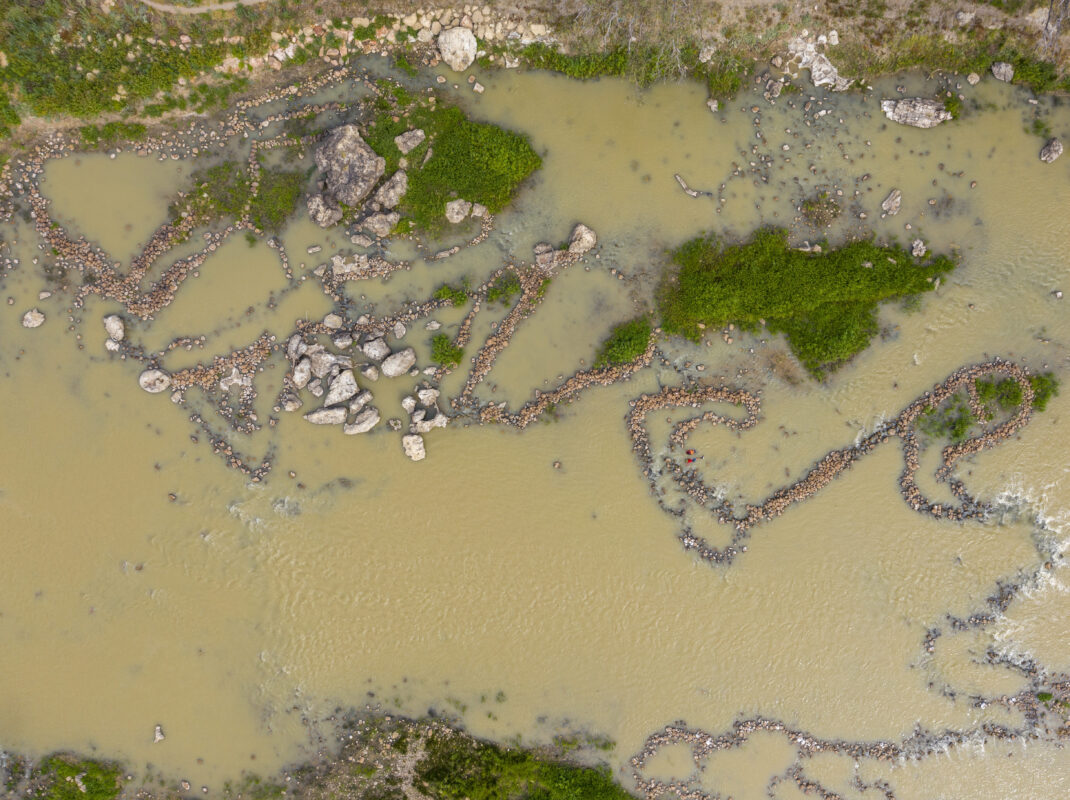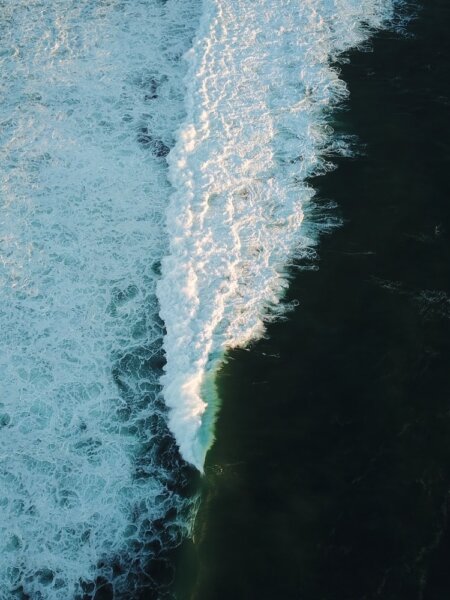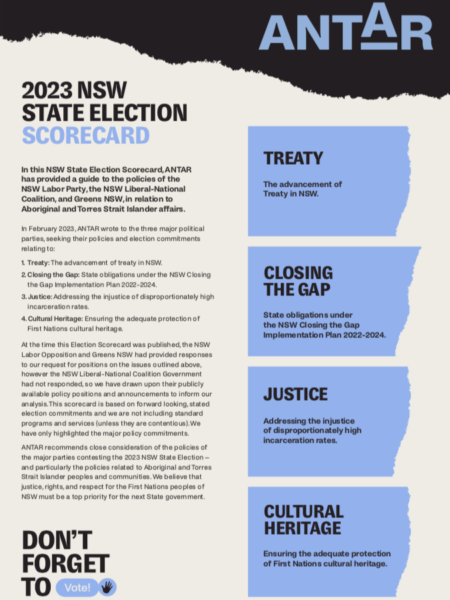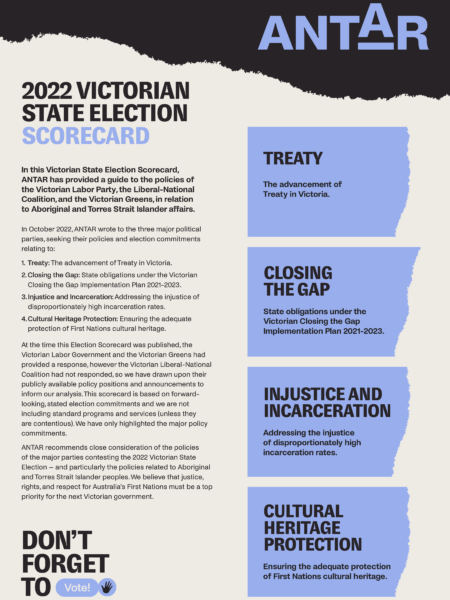The Issue
By the 1990’s, regulation of the fishing industry had resulted in Aboriginal fishers being slowly squeezed out. Relations between First Nations fishers and the NSW government has now deteriorated to the point of criminal prosecutions being brought against First Nations cultural fishers for taking catches deemed to be excessive. This despite the fact that no numerical limits have yet been specified for these traditional practices (see Government Submission to the current Enquiry for details). While First Nations communities on the NSW south coast comprise about four percent of the population, Oxfam research indicates that eight out of ten convictions (including jail terms) for fisheries offences, since 2009 have been of Aboriginal people.
Wally Stewart on behalf of the south coast Aboriginal Fishing Rights Group (AFRG) provides a comprehensive account of fishing practices from the beginning of European settlement to the present day and outlines the AFRG’s campaign to have their fishing values recognised and respected. The current stalemate has a long and complex history.
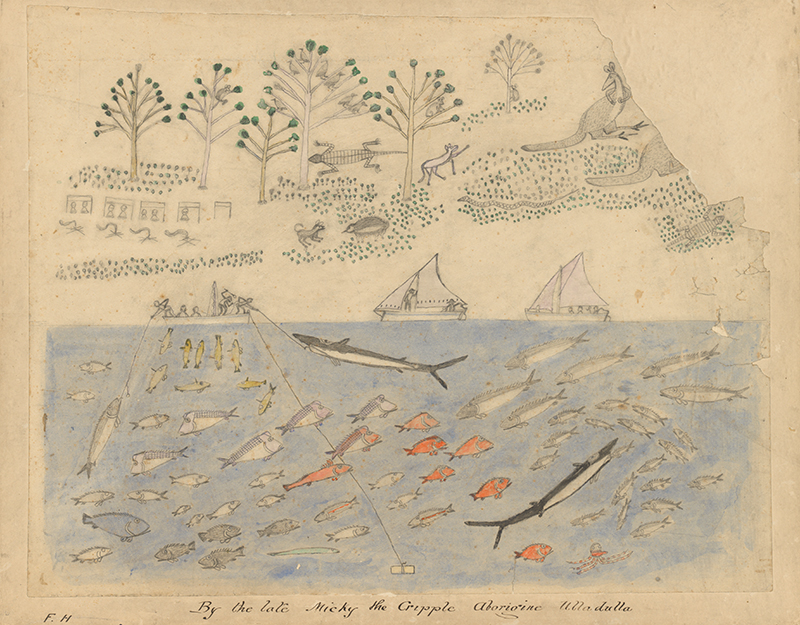
Fishing activities of First Nations people and settlers near Ulladulla, New South Wales, approximately 1885, Mickey of Ulladulla.
Context
First Nations people on the south coast of New South Wales belong to a number of different groups, including those who identify as Brinja-Yuin, Budawang, Jerrinja, Murramarang, Walbunja, Wandandian, Wodi Wodi, Yuin, Yuin-Monaro, and more.
For at least 20,000 years, Aboriginal and Torres Strait Islander peoples have fished the southern coasts of Australia for food. Over time, European colonisation of Australia has meant systematic restriction of the customary fishing practices and the eventual muscling out of Aboriginal communities from their ancient fishing rights by commercial and recreational fishing by non-Indigenous people. First Nations people along the length of the south coast of NSW were amongst those who bore the brunt of the early decades of the 1788 colonial invasion. Despite this reality, the coastal communities fared somewhat less catastrophically than the hinterland communities of the Sydney Basin, both westward and northward.
Nineteenth century colonial government records consistently confirm that, ‘relationships between south coast First Nations and various economies such as logging, whaling, and fishing were two-sided’. From the early nineteenth to the late twentieth centuries, south coast First Nations people engaged in survival fishing and at times participated in commercial fishing. A government briefing paper, recounts how the beach haul fishery industry, that began as forced labour for mission residents in the early twentieth century, over subsequent generations has become incorporated into customary fishing practices.
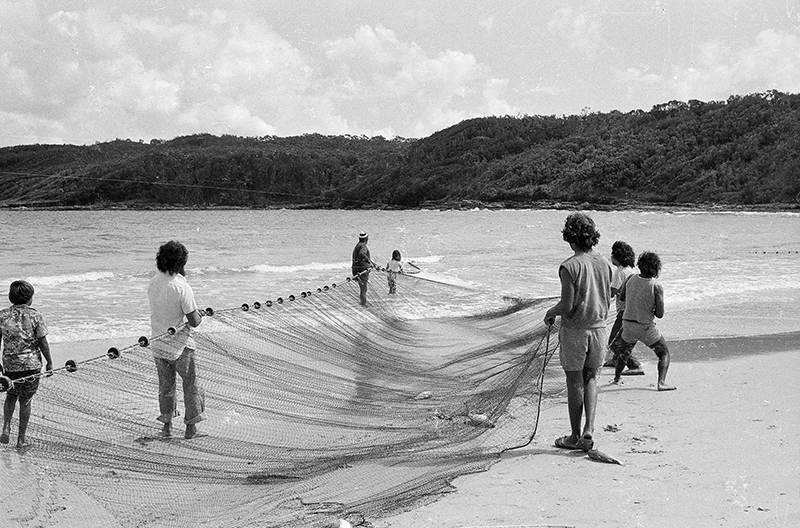
Children and adults pulling in nets on the beach at Wreck Bay, NSW, 1979-1980. AIATSIS Collection.
Since Federation, management of fisheries has been a shared responsibility between the Commonwealth and the States and recognition of ‘traditional’ fishing rights has varied significantly across Australia. From the 1970’s onwards, governments around the country began to strengthen regulation of fisheries (e.g. licencing, quotas, bag limits). Particularly in NSW, where regulations had always been strict for all citizens in coastal fishing, Aboriginal fishers have been slowly edged out. A 2000 research document that examined Native Title and Sea Rights provides evidence of First Nations sea rights continuing to take second place to other interest groups competing for an economic stake in sea rights.
Timeline
1993: the Mabo High Court decision that ‘rendered terra nullius a fiction’ gave rise to National Native Title legislation. While never ceded by First Nations communities, recognition of sea rights has not been satisfactorily resolved in some Australian jurisdictions including NSW.
2004: The National NativeTitle Tribunal (NNTT) facilitated the establishment of a set of National Indigenous Fishing principles. These principles were the outcome of 12 months work by experts from all relevant parties in the fishing industry as well as all State and Federal government representatives. The principles included a definition of customary fishing; that customary fishing wherever possible will translate into a share of the overall allocation of sustainable managed fisheries and that governments and other stakeholders at minimum, implement assistance strategies to increase Indigenous participation in fisheries-related businesses.
2005: These ‘Fishing principles to guide Indigenous involvement in marine management’ were endorsed by the Federal Government in the Commonwealth Fisheries Resources Sharing Framework.
2009: The NSW parliament passed the Fisheries Management Amendment Act (114 NSW), that provided a general exemption for Aboriginal people from paying a fee for recreational fishing (section 37), exempted First Nations fishers from other sections (17&18 prohibitions beyond certain limits) and incorporated the National Native Title Tribunal’s definition of Aboriginal cultural fishing:
[as] fishing activities and practices carried out by Aboriginal persons for the purpose of satisfying their personal, domestic or communal needs, or for educational, ceremonial or other traditional purposes, and which do not have a commercial purpose.
Controversially Section 21AA of the Act, ‘Special provision for Aboriginal cultural fishing’ to the present day has never had a Commencement proclamation edict from the NSW government.
2009: Australia endorsed the United Nations Declaration of the Rights of Indigenous Peoples (including UNDRIP, Articles 20, 21, 25, 26).
2016: A Report, ‘Inquiry into economic development in Aboriginal communities of the NSW Legislative Council Standing Committee’ made a unanimous finding, ‘that there is a desperate and moral need for leadership and action on the deplorable outcomes for our Aboriginal communities’. It made 39 recommendations – the final one being,‘that the NSW Government proclaim section 21AA of the Fisheries Management Act 1994’.
2018: A Native Title Determination that encompasses the whole of the disputed fisheries region is made for an area of almost 17,000 square kms, from the Royal National Park south of Sydney, to south of Eden on the far south coast and extending three nautical miles out to sea. Fifty two family groups are associated with the claim and more than 500 First Nations people approved the submission in 2016.
2021: In November a private members business item called on the NSW Perrottet Government to ‘commence these provisions [s 21AA] without delay and without any further regulation’. The motion was passed and a Legislative Council ‘Inquiry into the Commencement of the Fisheries Management Amendment Act 2009’ was established to: ‘focus on why the section 21AA has not commenced and the impact of that non commencement… [on Aboriginal communities in NSW].
2022: The NSW government called for submissions from the public. All but four of the 44 submissions provided by individuals and organisations support the concept and enhancement of customary fishing for First Nations communities.
